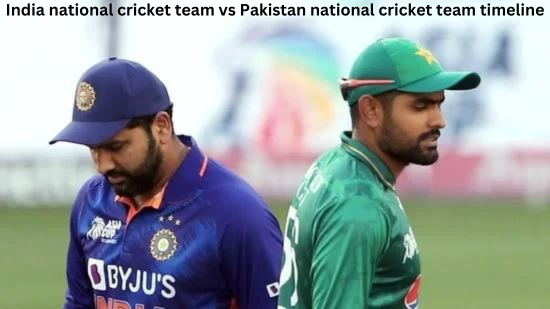Prepare to immerse yourself in the electrifying world of cricket rivalry—India vs. Pakistan. This historic clash of cricketing titans has enthralled fans globally for decades, delivering a spectacle of skill, zeal, and fierce rivalry in each match. In this blog post, we’ll explore the rich history and thrilling encounters between the India National Cricket Team vs Pakistan National Cricket Team timeline, spotlighting pivotal moments, key statistics, legendary players, and the influence of political dynamics on this iconic sporting conflict. So grab your favorite snacks, settle back, and journey through the epic narrative of one of cricket’s most celebrated rivalries!
The cricket rivalry between India and Pakistan, tracing its roots back to the mid-20th century, is steeped in the complex historical and political landscapes that shape both nations. Since their inaugural Test match in 1952, each encounter at the World Cups and beyond has been charged with national pride and a rich sense of heritage.
History of the India-Pakistan Cricket Rivalry
The India-Pakistan cricket rivalry is steeped in history, with each match etched into the collective memory of their supporters. The origins of this intense rivalry can be traced back to the partition of India in 1947, which was followed by deep political and military tensions. Cricket matches between the two have often been seen as an extension of their broader geopolitical conflicts, making each game a highly charged event.
India and Pakistan first faced each other in a Test match in 1952, with India hosting a four-match series. This series not only marked the beginning of one of the greatest rivalries in cricket but also set the stage for decades of thrilling cricket. The matches were highly competitive and, for many, served as a symbolic settling of scores.
Over time, the cricket rivalry has observed several memorable moments—from Javed Miandad’s last-ball six in 1986 to India’s triumph in the inaugural T20 World Pot in 2007 against Pakistan. Such moments have not only defined players’ careers but have also had a lasting impact on fans around the world. Beyond the field, these matches are celebrated and mourned nationally, reflecting the deep-seated rivalry between the two countries. The games are a mix of brilliant cricket and high emotions, making each match a significant chapter in the cricket history of both nations.
India national cricket team vs Pakistan national cricket team timeline
The cricketing encounters between India and Pakistan are punctuated by significant historical markers that reflect the broader political and cultural narratives of the two nations. The timeline of their rivalry begins in 1952 with their first official Test series, where India hosted Pakistan, setting the stage for a long-standing cricket rivalry filled with high drama and intense emotions.
In the decades that followed, the teams met sporadically, with each match garnering massive interest. The 1985 Rothmans Four-Nations Cup final saw a spectacular performance from India, winning against Pakistan in Sharjah, a venue that would witness many more Indo-Pak cricket battles. The 1986 Austral-Asia Cup final in Sharjah featured one of the most dramatic moments in cricket history when Javed Miandad hit a last-ball six off Chetan Sharma to clinch victory for Pakistan.
The 1999 Chennai Test is often remembered for the sportsmanship displayed by the Chennai crowd, who gave the Pakistani team a standing ovation after their narrow 12-run victory. In the new millennium, the 2007 ICC World Twenty20 final in Johannesburg became a historic event, with India defeating Pakistan in a thrilling match that concluded with a memorable over by Joginder Sharma.
These timeline events are not just cricket matches but are historical milestones that often brought the two nations together, even amidst turbulent relations.
Critical Moments in India vs Pakistan Cricket Matches
Throughout the storied rivalry between India and Pakistan, several matches have been defined by moments of sheer brilliance, unexpected turns, and heart-stopping finishes. One of the earliest critical moments came during the 1986 Austral-Asia Cup final, with Javed Miandad’s last-ball six against India, a shot that is etched in the memories of cricket fans worldwide.
Another monumental moment occurred during the 1996 World Cup quarter-final in Bangalore, where a fiery innings by Ajay Jadeja against Pakistan’s Waqar Younis changed the momentum of the game, leading India to a memorable victory. In 2003, during the World Cup match in Centurion, Sachin Tendulkar’s masterful 98 off 75 balls set the tone for India’s win, showcasing his dominance over Pakistan’s formidable bowling attack.
The 2007 ICC World Twenty20 final featured a nail-biting finish where India’s Joginder Sharma bowled to Misbah-ul-Haq in the last over, culminating in a dramatic catch by Sreesanth. This win not only secured India the championship but also sparked the T20 cricket fever across the nation.
These critical moments have transcended the sport, influencing the cricketing psyche of both nations, making each match a highly anticipated event, filled with national pride and passionate support.
Statistics and Records of India vs Pakistan National Cricket Team
The India vs Pakistan cricket rivalry is rich with fascinating statistics and records that highlight the competitive nature of their encounters. Historically, Pakistan had an edge in Test matches, winning 12 out of the 59 games, whereas India won 9, with the rest ending in draws. In One Day Internationals, the competition is closely matched with Pakistan winning 73 out of 132 matches, and India winning 55.
In the shorter T20 International format, India holds a distinct advantage with 7 wins out of 11 matches. A significant record in World Cup encounters across all formats shows India maintaining a perfect record, having never lost to Pakistan in any World Cup match, a streak that includes 7 ODI World Cup and 5 T20 World Cup matches.
Individual performances in these matches also stand out, with Sachin Tendulkar scoring the most ODI runs in Indo-Pak matches, amassing over 2,500 runs. Among bowlers, Wasim Akram of Pakistan has taken the most wickets in ODIs between the two teams. These statistics not only highlight the talents and achievements of individual players but also underscore the high level of competition and pressure that defines the India-Pakistan cricket rivalry.
Influence of Political Tensions on Cricket Matches Between the Two Nations
The cricket matches between India and Pakistan have often been heavily influenced by the prevailing political climate between the two countries. Due to their complex geopolitical relations, cricket has alternated between being a bridge for peace and a casualty of conflict. Several cricket tours and matches have been canceled or postponed due to political tensions, wars, and military standoffs, making the cricketing schedule between these nations highly unpredictable.
For instance, bilateral cricket ties were suspended after the 2008 Mumbai attacks, and attempts to revive them have been sporadic and often met with political resistance. The heightened emotions and the symbolic significance of these matches reflect broader national sentiments, making each game a high-stakes event beyond the realm of sports. Furthermore, cricket diplomacy has occasionally been used as a tool to thaw relations, with leaders from both nations using cricket matches as opportunities to engage in dialogue, demonstrating the profound influence on political relations have on the cricketing connections between the India and Pakistan.
Memorable Matches and Players from Both Teams
Over the decades, several matches between India and Pakistan have left an indelible mark on the cricket world. The 1986 Austral-Asia Cup final, where Javed Miandad hit a last-ball six, and the 1999 Chennai Test, which Pakistan won by 12 runs and was followed by a standing ovation from the Indian audience, are etched in the annals of cricket history.
Iconic players like Sachin Tendulkar, whose prowess with the bat has seen numerous outstanding performances against Pakistan, and Imran Khan, whose leadership and cricketing skills were pivotal for Pakistan, have become legendary figures in their countries. More recently, players like Virat Kohli and Babar Azam have become the new faces of this intense rivalry, showcasing exceptional talent and sportsmanship.
The Future of India-Pakistan Cricket Rivalry
The future of the India-Pakistan cricket rivalry remains uncertain but highly anticipated. While political relations continue to influence the scheduling of bilateral series, global tournaments like the ICC World Cup and the Asia Cup ensure that the teams meet periodically, keeping the rivalry alive. These matches are not only a showcase of top-tier cricket but also carry a hope for peace and camaraderie through sports.
The increasing popularity of cricket worldwide, coupled with the commercial success of matches between India and Pakistan, suggests that stakeholders may find innovative ways to facilitate more frequent encounters. Moreover, the emergence of new cricketing talents in both countries promises to add fresh chapters to this storied rivalry, potentially easing political tensions through the universal language of sports.
Conclusion
The cricket rivalry between India national cricket team vs Pakistan national cricket team timeline is more than just a series of games; it is a profound cultural phenomenon that encapsulates a mixture of competitive sport, national delight, and political narratives. Each match, rich in history and emotion, is a microcosm of the larger dynamics between the two nations. While political tensions have often mirrored the ups and downs in their cricketing ties, the enduring spirit of the game and its players continues to hold a unifying power, transcending borders and conflicts.
As both nations continue to evolve, the hope remains that cricket will serve as a bridge to a more peaceful and collaborative relationship. The passion, drama, and camaraderie displayed on the cricket field reflect a deep-seated respect for the game and each other, pointing towards a future where sportsmanship prevails over conflict. The India-Pakistan cricket rivalry, with almost all their difficulties, keeps one of the extremely wonderful spectacles in the world of sports.


